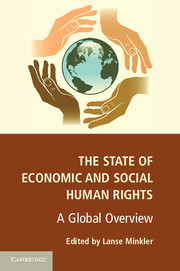Book contents
- Frontmatter
- Contents
- Contributors
- Acknowledgments
- 1 Introduction: Why Economic and Social Human Rights?
- I CORE RIGHTS
- II NONDISCRIMINATION
- III META
- 10 Establishing a Social and International Order for the Realization of Human Rights
- 11 Beyond a Minimum Threshold: The Right to Social Equality
- 12 The Right to Development from a Human Rights Approach: Conceptual Bases, Legal Framework, and Contemporary Challenges
- 13 Constitutional Environmental Human Rights: A Descriptive Analysis of 142 National Constitutions
- 14 Conclusion: Reflections on the Theory and Practice of Economic and Social Rights
- Index
- References
12 - The Right to Development from a Human Rights Approach: Conceptual Bases, Legal Framework, and Contemporary Challenges
Published online by Cambridge University Press: 05 February 2013
- Frontmatter
- Contents
- Contributors
- Acknowledgments
- 1 Introduction: Why Economic and Social Human Rights?
- I CORE RIGHTS
- II NONDISCRIMINATION
- III META
- 10 Establishing a Social and International Order for the Realization of Human Rights
- 11 Beyond a Minimum Threshold: The Right to Social Equality
- 12 The Right to Development from a Human Rights Approach: Conceptual Bases, Legal Framework, and Contemporary Challenges
- 13 Constitutional Environmental Human Rights: A Descriptive Analysis of 142 National Constitutions
- 14 Conclusion: Reflections on the Theory and Practice of Economic and Social Rights
- Index
- References
Summary
Introduction
The right to development is the right of individuals and peoples to an enabling environment for development that is equitable, sustainable, participatory, and in accordance with the full range of human rights and fundamental freedoms. Such an environment is free from structural and unfair obstacles to development domestically as well as globally (UN High Level Task Force 2010).
The current scale and severity of global poverty provide a jarring contrast and add urgency to efforts to attain the sought-for enabling environment. In light of this, this chapter discusses the key attributes of the right to development from a human rights perspective, considering its conceptual and legal bases. As such, it particularly examines social justice; participation, accountability, and transparency; and international cooperation. It gives special emphasis to the legal framework of the right to development, examining the extent of the state duties to respect, protect, and fulfill the right to development at a national and international level.
Considering the 1986 Declaration on the Right to Development as a dynamic, living instrument of enduring value in addressing current and emerging challenges central to development, this chapter concludes by highlighting the contemporary challenges and perspectives of the implementation of the right to development, inspired by the human rights-based approach to development and a development approach to human rights.
- Type
- Chapter
- Information
- The State of Economic and Social Human RightsA Global Overview, pp. 306 - 328Publisher: Cambridge University PressPrint publication year: 2013
References
- 1
- Cited by



